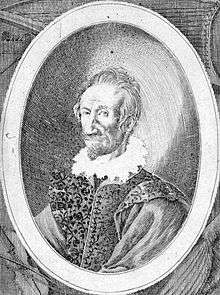Claude Goudimel

Claude Goudimel (c. 1514 to 1520 – between 28 August and 31 August 1572) was a French composer, music editor and publisher, and music theorist of the Renaissance.
Biography
Claude Goudimel was born in Besançon. Few details of his life are known until he is documented in Paris in 1549, where he was studying at the University of Paris; in that year he also published a book of chansons. In the early 1550s he worked with printer Nicolas Du Chemin, and may have still been studying at the University of Paris until 1555; by 1555 he was also Du Chemin's partner in the publishing business.
Goudimel moved to Metz in 1557, converting to Protestantism, and is known to have been associated with the Huguenot cause there; however he left Metz due to the increasing hostility of the city authorities to Protestants during the Wars of Religion. First he settled in his native town of Besançon, and later moved to Lyon.
He was murdered in Lyon sometime between 28 and 31 August 1572, during the St. Bartholomew's Day Massacre, along with much of the Huguenot population of the city.
Music and influence
Goudimel is most famous for his four-part settings of the psalms of the Genevan Psalter, in the French versions of Clément Marot. In one of his four complete editions he puts - unlike other settings at the time - the melody in the topmost voice, the method which has prevailed in hymnody to the present day. In addition he composed masses, motets, and a considerable body of secular chansons, almost all of which date from before his conversion to Protestantism (probably around 1560). Goudimel’s style tends to be homophonic, with an intriguing use of syncopated rhythm and melisma and staggered voice entries to bring out inner parts, especially in the chansons. His Psalm settings, however, are more polyphonic, characteristic of the moderate contrapuntal style exemplified by the chansons of Jacques Arcadelt, an approximate contemporary.
The widespread claim that he taught Palestrina is now regarded as untenable. His Opera Omnia extends to 14 volumes, though several of his works are fragmentary, missing one or more voices.
References and further reading
- Gustave Reese, Music in the Renaissance. New York, W.W. Norton & Co., 1954. ISBN 0-393-09530-4
- The Concise Edition of Baker's Biographical Dictionary of Musicians, 8th ed. Revised by Nicolas Slonimsky. New York, Schirmer Books, 1993. ISBN 0-02-872416-X
External links
- Free scores by Claude Goudimel in the Choral Public Domain Library (ChoralWiki)
- Free scores by Claude Goudimel at the International Music Score Library Project (IMSLP)
- The Genevan Psalter Resource Center
- Psalm 25 A toi, mon Dieu, mon coeur monte
- Psalm 25 "A toi, mon Dieu, mon cœur monte" from the Genevan Psalter performed at an event at the cathedral in Noyon, France marking the 500th anniversary of John Calvin's birth in 2009. YouTube video (3:06)